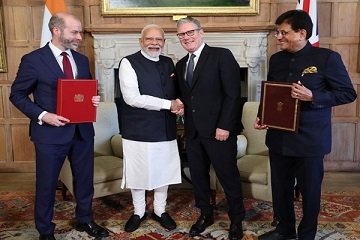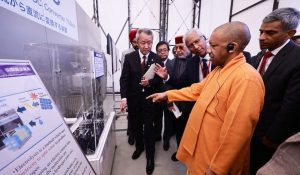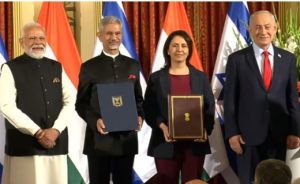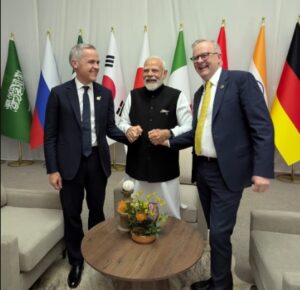
Last Updated on July 24, 2025 10:37 am by BIZNAMA NEWS
R. Suryamurthy
India and the United Kingdom today signed a landmark Comprehensive Economic and Trade Agreement (CETA) in New Delhi, an accord poised to significantly boost bilateral trade and investment, create jobs, and usher in a new era of economic partnership between the two nations.
The agreement was formally cemented by India’s Commerce and Industry Minister, Piyush Goyal, and UK Secretary of State for Business and Trade, Jonathan Reynolds. The signing ceremony was attended by Indian Prime Minister Narendra Modi and UK Prime Minister Sir Keir Starmer, alongside India’s Minister of External Affairs Dr. S. Jaishankar and UK Chancellor of the Exchequer Rachel Reeves.
Unprecedented Market Access for Indian Goods
A cornerstone of the CETA is the unprecedented market access granted to Indian goods, with zero-duty access on 99% of tariff lines, encompassing nearly 100% of the trade value. This crucial provision is expected to unlock significant export opportunities for India’s labor-intensive sectors, including:
Textiles and Clothing: Previously facing duties of up to 12%, these products will now enjoy complete liberalization.
Leather and Footwear: Duties as high as 16% will now be eliminated, allowing duty-free entry into the UK.
Gems and Jewellery
Marine products: UK import duty on marine products will fall to zero from up to 20%, opening a $5.4 billion UK market for Indian fishermen.
Toys
Processed Food: 99.7% of tariff lines will now enjoy zero duty, down from as high as 70%.
Furniture and Sports Goods: Previously facing duties of up to 4%, these will now be duty-free.
This move is anticipated to generate large-scale employment and empower artisans, women-led enterprises, and Micro, Small, and Medium Enterprises (MSMEs) across India. Fast-growing sectors like engineering goods, auto components, and organic chemicals are also poised for substantial gains.
“This CETA marks a milestone in the trade relations between two major economies, setting an ambitious and balanced framework,” stated Union Minister for Commerce and Industry, Piyush Goyal, expressing gratitude for Prime Minister Modi’s visionary leadership. He emphasized that the agreement will serve as a catalyst for inclusive growth, benefiting various sectors while safeguarding India’s core interests.
Ambitious Commitments in the Services Sector
The agreement also features ambitious services commitments from the UK, a first of its kind. This wide-ranging package covers critical sectors such as:
IT/ITeS
Financial and professional services
Business consulting
Education
Telecom
Architecture
Engineering
These commitments are expected to unlock high-value opportunities and drive job creation in India’s robust services sector.
Enhanced Mobility for Indian Professionals and Breakthrough Social Security Exemption
CETA introduces streamlined pathways for enhanced global mobility for Indian professionals, including simplified entry for Contractual Service Suppliers, Business Visitors, Intra-Corporate Transferees, and Independent Professionals like yoga instructors, chefs, and musicians. Up to 1,800 Indian chefs, yoga instructors, and classical musicians can move temporarily to the UK to provide services.
In a significant breakthrough, a Double Contribution Convention (DCC) will exempt Indian workers and their employers from social security contributions in the UK for up to three years. This provision is expected to significantly improve take-home pay for Indian professionals and reduce costs for Indian companies, boosting the competitiveness of Indian talent abroad. An estimated 75,000 Indian workers in the UK are set to benefit from this exemption.
Doubling Bilateral Trade and Broader Collaboration
With bilateral trade currently standing at nearly $56 billion, both nations have set a joint goal to double this figure by 2030. The signing of CETA follows the successful conclusion of negotiations announced on May 6, 2025, underscoring a shared commitment to strengthening economic integration between the world’s fourth and sixth largest economies.
Beyond trade, the two prime ministers have also agreed on closer collaboration in defense, education, climate, technology, and innovation. Enhanced intelligence sharing and operational collaboration will assist in tackling corruption, serious fraud, organized crime, and irregular migration, including a new agreement for criminal records sharing.
Benefits for UK Exporters
The UK government anticipates the deal will boost the British economy by £4.8 billion a year. Average tariffs for UK exports to India will drop significantly, from 15% to 3%, making it easier for British companies to sell goods in India. Key UK exports that will see levies fall include:
Gin and whisky: Tariffs will be halved from 150% to 75% immediately, dropping to 40% by 2035.
Aerospace, electricals, and medical devices
Cosmetics
Lamb, salmon, chocolates, and biscuits
Luxury cars
Industry Welcomes the Agreement
The CETA has been widely welcomed by industry leaders from both countries.
Anil Talreja, Partner, Deloitte India, hailed it as a “watershed moment” reflecting a strategic shift towards diversifying trade and investment relationships. “This will go a long way to mitigate external shocks while unlocking untapped market potential,” he added.
Shashi Mathews, Partner, CMS INDUSLAW, called the signing a “defining moment in the modern economic partnership.” He highlighted that the agreement “lays the foundation for a deeper, forward-looking alliance that marries India’s scale and growth potential with the United Kingdom’s technology, capital and services expertise.”
Shiraz Askari, President, Apollo Fashion International Limited, termed the India-UK FTA a “game-changer for the textile and apparel sector,” predicting a “30–40% surge in exports over the next few years.”
Sunil Bharti Mittal, Founder & Chairman of Bharti Enterprises and Co-Chair of the India-UK CEO Forum, who led an Indian industry delegation accompanying Prime Minister Modi, stated, “Indian industry across all sectors welcomes the India-UK FTA with great optimism. This agreement establishes a modern, forward-looking partnership that will stimulate innovation, ease market access, and foster investment.”
Aditi Nayar, Chief Economist, ICRA, anticipates a significant enhancement in bilateral trade, with 99% of Indian exports expected to face zero duty. She also noted the positive impact on financial flows, with the FTA expected to ease professional mobility and boost remittances.
Rudra Kumar Pandey, Partner, Shardul Amarchand Mangaldas & Co., highlighted the agreement’s role in enhancing India’s trade facilitation architecture and its potential to lend positive momentum to ongoing India-EU FTA negotiations.
Abhishek Khaitan, Managing Director, Radico Khaitan Ltd., expressed optimism for the alco-bev industry, foreseeing “significant strategic and cost advantages” from the reduction in import duties on Scotch whisky and gin.
The Trade Promotion Council of India (TPCI) lauded the agreement, with Chairman Mohit Singla emphasizing the “remarkable opportunities for Indian goods and services exporters.” He particularly noted the “historic provision” exempting Indian professionals in the UK from social security taxes for three years.
Sanjaya Mariwala, Executive Chairman and Managing Director of OmniActive Health Technologies, highlighted the potential for growth in the healthcare sector, with regulatory barriers coming down and leading to more affordable services and better collaboration.
The Confederation of Indian Textile Industry (CITI) warmly welcomed the FTA, with Chairman Shri Rakesh Mehra stating its potential to “significantly transform the fortunes of the entire Indian textile sector and provide the kind of impetus which is necessary to help India realize its ambitious goal of achieving textile and apparel exports of $100 billion by 2030.”
Future Prospects
While the agreement signifies a major step forward, discussions continue on a bilateral investment treaty aimed at protecting British investments in India and vice versa. Talks are also ongoing regarding UK plans for a tax on high-carbon industries, which India believes could unfairly impact its imports.
The agreement, okayed by the Indian cabinet earlier this week, still awaits approval from the UK Parliament and is expected to take at least a year to come into effect.








